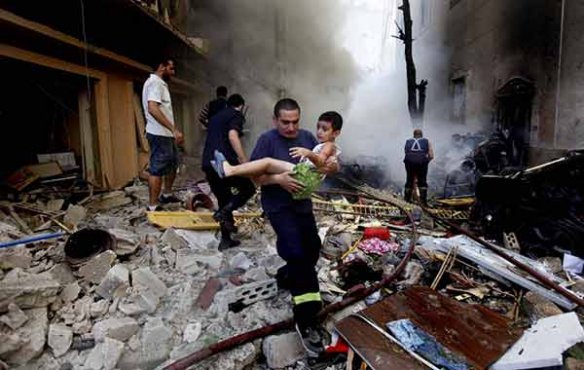The tragedy in Syria bears witness to the deep crisis afflicting the international commitment to the “protection of civilians”. But there is a way out.

Against the background of a politically divided Security Council, there is a need for a new international strategy to protect civilians caught up in armed conflicts.
The international system for crisis management that emerged after the Cold War assumed a degree of political consensus that has now evaporated. As a result we are left with peace policies that do not work.
From worse to a true hell
This is the clear message of a recent report on the international involvement in Syria during 2014. The report shows how the situation for civilians has gone from bad to worse – or more accurately from worse to a true hell – despite the demands of three Security Council resolutions.
In a comment on the report, Jan Egeland writes: “The bitter reality is that we are failing not because of a lack of solutions. The reason is that the parties are not willing to do what is necessary. Acting together, Russia, the United States, Saudi Arabia, Iran, Qatar and other UN countries possess the necessary influence to secure the implementation of the UN resolutions.”
This is right from a humanitarian perspective, but the states have their reasons for not being willing. The challenge for the UN is to provide a solution that they all see as serving their interests, and this is where the UN apparatus for conflict response is failing.
In order for the UN and associated states and organisations to effectively protect civilians in the current international political climate, their policies have to change in four areas: 1. Emergency aid; 2. Peacekeeping; 3. Negotiations; and 4. Peacebuilding.
1. Emergency aid
In order to gain access to civilians in countries affected by violent conflicts, humanitarian efforts need to regain their neutral and independent status.
During the 1990s, emergency aid became associated with longer-term efforts to promote peace, democracy and human rights. As a result, peace operations became the new primary arena for the provision of emergency aid. This was the outcome of a broad international political consensus that political and economic liberalization would bring peace and development.
With few exceptions like the Red Cross, emergency aid organizations deliberately politicized their aid efforts accordingly, with the result that they came to be viewed as extensions of Western foreign policy. In conflict situations where some of the parties see Western powers as a threat, emergency aid organizations are today met either with scepticism or with direct attacks. The losers are the civilians in need of assistance.
2. Peacekeeping
Peacekeeping operations have followed a similar trend. From acting as neutral parties in conflict zones, peacekeepers became an integral part of a Western peacebuilding agenda. As support has weakened for these types of peacebuilding efforts, the protection of civilians has become a central focus for peacekeeping operations, but in the wrong way.
Protection is understood as the provision of military protection of civilians against physical violence, which involves an expansion of responsibility and interference in countries that are ravaged by armed conflict and limited state control. In settings where civilians are targeted by armed groups, peacekeeping mandates have turned towards active military confrontation with rebel groups, like in DR Congo and Mali.
When major international actors are split in their positions on a conflict, this expansion and sharpening of peacekeeping makes it harder to reach a consensus on mandates. In addition, peacekeeping operations are rarely appropriate for engaging in active combat, which is also not where their primary potential for providing protection lies. Rather, this potential lies in supporting peace processes founded on negotiated solutions.
3. Negotiations
In the absence of liberal peacebuilding as a universal model for peace, the negotiations track must be upgraded. Internationally supported peace negotiations are the only realistic alternative to forms of international involvement such as that seen in Syria, where the various warring parties are supported by outside actors with conflicting interests.
Currently, negotiations tend to take place in an improvised fashion, without sufficient international or local support, and without a realistic framework for implementing agreements. In addition, many negotiating processes lack a principled framework designed to avoid rewarding parties politically for having resorted to arms.
The biggest disadvantage of such political rewards is that they create incentives for parties elsewhere to resort to armed conflict. Upgrading the track of negotiations would involve a more firm rooting in the Security Council, and linking negotiations with a new generation of peacebuilding strategies where necessary.
4. Peacebuilding
The concept of peacebuilding was originally invented in order to support peacekeeping operations – not the other way around.
In order to avoid throwing out the baby with the bathwater, the UN should draw on the hard-earned experiences of recent decades and develop a new generation of peacebuilding strategies. These would have to be based on negotiated solutions with broad international backing rather than on a particular political ideology like Western liberalism.
As a framework for international crisis management, the ideal of liberal peacebuilding offered a shortcut from geopolitical contestation – a smooth elevator ride from the hell of war to heaven on earth. A more realistic strategy for the protection of civilians in situations such as that in Syria today is far less ideal – a worn-out emergency exit that opens to a long and wretched stairway.
- This article is derived from the author’s participation in the research project Protection of Civilians: from principle to practice. A more detailed analysis of the Security Council’s obligation to protect civilians is available here.
- A version of this text was published in Norwegian in Aftenposten 12 March 2015: Det finnes en nødutgang ut av helvetet.
- Translation from Norwegian: Fidotext